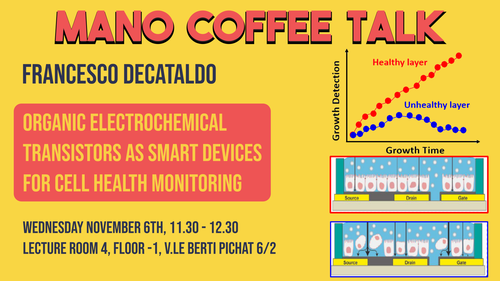Contatto di riferimento: Giovanni Armaroli
Partecipanti: Francesco Decataldo
Current technologies to monitor formation and disruption in in vitro cell cultures are based either on optical techniques or on electrical impedance/resistance measurement, which often rely on cumbersome and time-consuming measurements and data analyses. In this talk, Poly(3,4-ethylenedioxythiophene) polystyrene sulfonate (PEDOT:PSS)-based organic electrochemical transistors (OECTs) are proposed as fast and real-time monitoring devices for a large variety of cell
lines.
OECT configuration and properties are descripted, together with a brief electrical
characterization of the devices and the theoretical model of cell-device interaction. Then, experimental results are reported: in detail, an investigation of how and why two device configurations provide a different response to leaky-barrier (NIH-3T3) and strong-barrier (CaCo-2) cell lines growth and detachment is studied.
Furthermore, since nanomaterials are being widely used in medical applications and consumer products (such as cosmetics, fabrics, and food packaging), even though their impact on health and on the environment is yet to be understood, OECTs are employed for real-time, reliable monitoring of toxic effects induced by nanoparticles on cells. CaCo-2 and NIH-3T3 cell lines are again used as intestinal and skin “barrier” models, and it is demonstrated the ability of these devices to assess the
coating-dependent toxicity of nanoparticles and monitor the cell health status as a function of exposure time, allowing useful insight on the interaction processes between nanomaterials and cells.
